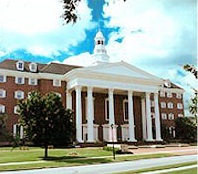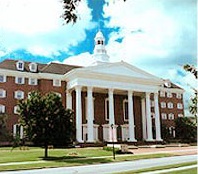This spring, the board of trustees at Wheaton College will appoint a new president. As the flagship evangelical institution–the “Harvard of the Christian schools,” say the tour guides–Wheaton will be closely monitored by other colleges, by pastors and churches around the world, and by observers of Christendom generally. Indeed, in a November 2009 article, the New York Times went so far as to characterize Wheaton, Illinois as a kind of “evangelical Vatican.”…
Interestingly, this apparent drift towards the center among students occurred during an administration that was initially charged with steering the college toward the right. Some members of the board of trustees were apparently alarmed in 1992 when the college newspaper reported that well over half the faculty was voting Democratic, and that membership in mainline Protestant denominations–especially the Episcopal Church–was on the rise. Wary of both Clintonism and Canterbury, these trustees began to see the college as on a slippery slope towards Oberlin, with the professors supplying much of the lubrication. In response, and without substantive consultation with the faculty, the board appointed a pastor from Memphis named Duane Litfin over candidates with widespread support and stronger academic credentials. Most prominent of these alternates was the then-Provost of Notre Dame, Nathan Hatch, himself a Wheaton alumnus and Trustee who was reportedly being groomed by the outgoing president, J. Richard Chase, to be his successor. (After the Litfin surprise, Hatch resigned from the board and later went on to become president of Wake Forest.) …
Each of the 40 or so people consulted for this article–including Bolyanatz, Van Dyke, and Hochschild–expressed renewed hope and goodwill for Wheaton as it moves into the next 150 years. These are not embittered grumblers.
The central question, rather, is this: How magisterial must an administration be regarding the interpretation of core commitments in order to keep the institution on course? Or, put another way, how much wiggle-room for reasonable, charitable differences in interpretation can be allowed while still preserving a school’s distinctive confessional character?
The question has been answered in one way over the last 17 years, and the results (as with all administrations, perhaps) have been decidedly mixed. The new president’s answer to this question is likely to be the defining characteristic of his or her administration. The sense of the constituency interviewed for this story (and my own sense as well) is that it is crucial to keep in mind that a college is not the church, and its presidency is not the papacy. Even at a systemic institution like Wheaton, there must be protected space–wiggle-room–for the creative thinking, loving disagreement, and emphatic debate–even about interpretation of the heritage–that set academic communities apart.
Professor Holmes sums up the vision:
We need a person of evangelical conviction and practice who understands and respects the diversity within the evangelical movement. We need one who understands the distinctives, the promise, and the problems of Christian higher education, an optimistic and creative leader who will support and encourage faculty in their multifaceted callings. We need someone who understands and inspires undergraduate students in their struggles and their problems, someone in whom they might find a model of wisdom and caring.
It could hardly be better put. May God speed the flagship.


